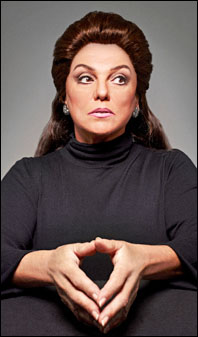
*
Forget, if you can, Mary Beth Lacey — and Mama Rose — and Madame Arkadina and Sally Adams and the various other roles that Tyne Daly has made fit her like a glove.
Instead, fancy her as one of the opera world's great treasures, Maria Callas, a larger-than-life diva diminished in the 1970s to a schoolmarm of sorts, dispensing the secret of her art to a new generation of singers passing through her searing scrutiny.
Callas did conduct such classes at Juilliard during her last years, and Terrence McNally turned that situation into a Tony Award-winning play, Master Class, with incidental music by the not-so-incidental Giuseppe Verdi, Giacomo Puccini and Vincenzo Bellini. The show occupied the illustrious, if disparate, likes of Zoe Caldwell, Patti LuPone and Dixie Carter for 598 performances on Broadway at the Golden Theatre from 1995 to 1997.
And now it's Tyne's turn. She holds class at the Friedman Theatre with an affable Manny at the piano (Jeremy Cohen) and a new herd of lambs led to the slaughter of her criticism (Alexandra Silber, Clinton Brandhagen, Garrett Sorenson and the unsinkable Sierra Boggess). "Doing Callas was not my idea," Daly wants it known right off. "That was Terrence's idea. It seemed entirely inappropriate to me. Have you noticed that I haven't had a lot of glamour requirements in my career? Have you noticed I play blue collar a lot?"
The assignment seemed a little daunting, so she decided to even the odds a bit by suggesting that a Broadway newbie guide her through the hectic heights and depths of Callas in decline.
How director Stephen Wadsworth has avoided the Main Stem until now is a mystery to everyone but him. He has certainly danced around the area long enough, staging major works at the Met and City Opera and once coming as close as Beth Henley's 1998 Impossible Marriage at Roundabout's Off-Broadway venue.
"Frankly, I've been in no hurry to jump into the commercial Broadway arena," he says. "I have quite enough to do without it. I teach at Juilliard, I direct operas and I write. I spent much of the '90s translating the plays of Marivaux [The Triumph of Love, The Game of Love and Chance, Changes of Heart], which I staged at the McCarter Theatre in Princeton. I also did Goldoni's Mirandolina there."
 |
||
| Tyne Daly as Maria Callas |
And he still found time to heed the S.O.S. of an old friend. "I've known Tyne for 20 years, but we've only been working together since 2008," he recalls. "She did Clytaemnestra for me in the Aeschylus Agamemnon at the Getty Villa in L.A."
Professionally, it proved quite an ice breaker, and he was the first person Daly thought of to helm Master Class. "When Terrence asked me to do this thing, I wanted Stephen as a safety," she says. "To play Callas is another set of requirements, and the only sort of royal I've played was Clytaemnestra for Stephen the summer before.
"More importantly, Stephen teaches at the Met and at Juilliard, and his area of expertise is how to teach singers to be actors. Callas reintroduced the idea of the 'acting singer' to opera. Many years before, opera was made to be sung and danced and acted. Everything. The whole package. The highest art. Then, opera became the world of bel canto, which means 'beautiful singing.' And that's what they all did — they just stood there and sang pretty for many years. Then Callas came roaring back to reinstate the idea that the drama — or comedy — was necessary to the whole picture. Indeed, it was in the music. You could find it in the music."
Wadsworth is the James S. Marcus Faculty Fellow at the Juilliard School, where he leads the advanced training program for singers. "Essentially," he points out, "this is the same program where Callas taught class and which, in turn, inspired Terrence to write his play, so I know and understand all of these characters very well indeed. I know both sides of the podium — the students as well as the guest teachers.
"I only saw Master Class once — with Caldwell, and she was splendid — but I think we're working with a really different landscape. There's a fierce, gutsy immediacy to Tyne's Callas, and it is quite different from the high theatricality that Caldwell brought to the part. Tyne is lean and mean, with a great vulnerability. The regality she displays is really another manifestation of self-protective behavior."
During class, Callas strays into self-inflicted monologues about her tempestuous relationship with Aristole Onassis. Daly sees these as mounds on the way to the mountaintop: "They're like 'Everything's Coming Up Roses' in Gypsy. The whole play is a mountain. Maybe this is the biggest mountain I've climbed since Gypsy — and Clytaemnestra. I have to tell you, Clytaemnestra is quite a mountain. My old dad used to say, 'You can't be a great actor unless you play the great roles.'"











